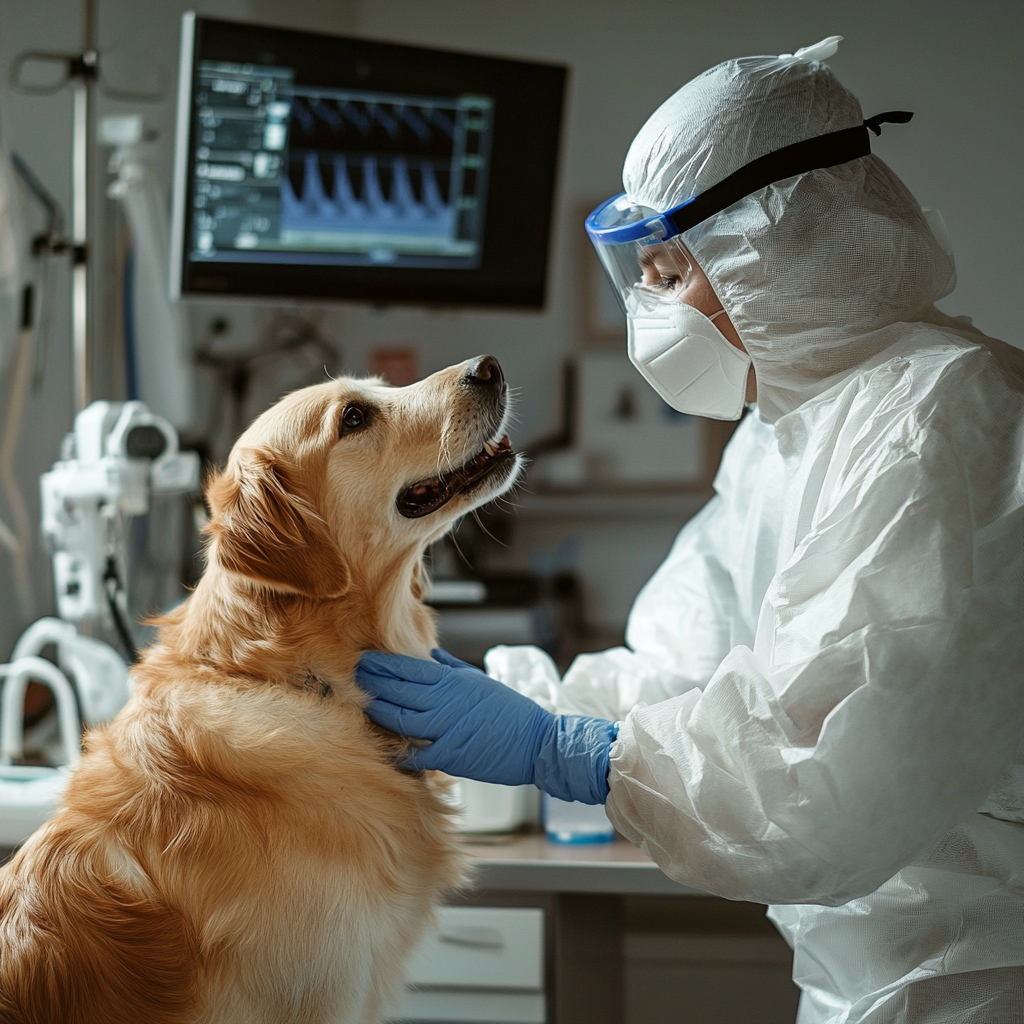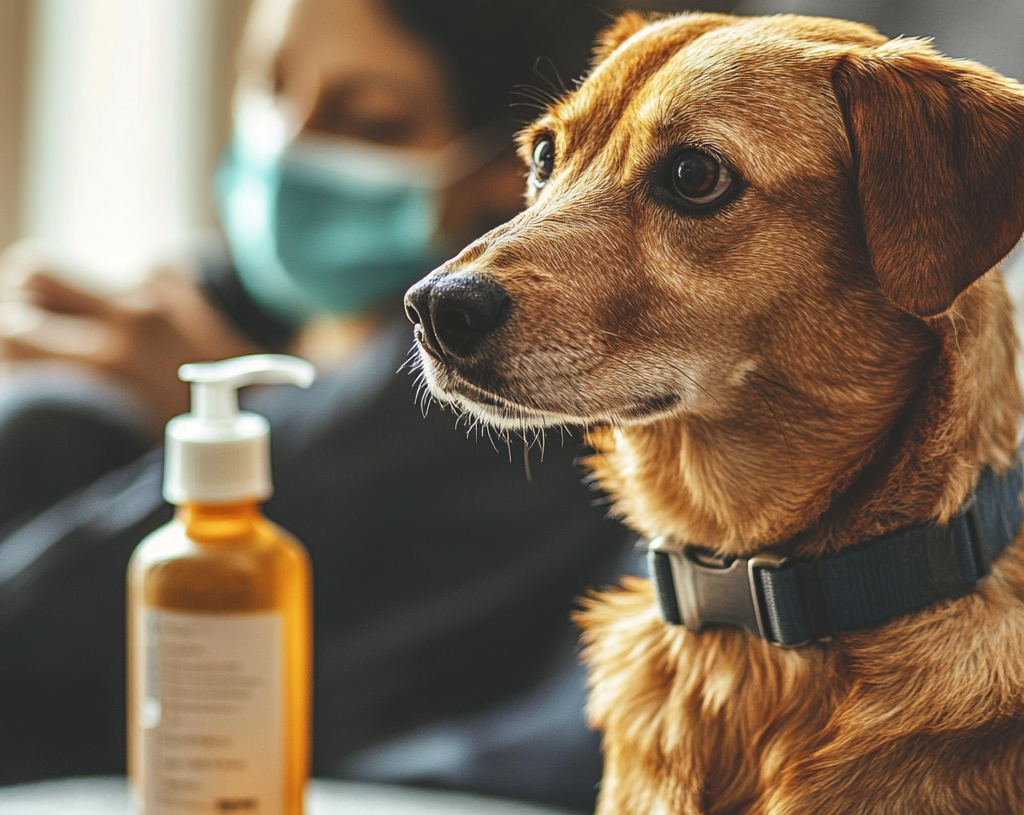Can my dog get coronavirus? Learn about the risks of pets contracting COVID-19, how it spreads, and what precautions you should take. Find out what scientists say about dogs and the virus.
Can My Dog Get Coronavirus? Understanding the Risks and Facts
With the world still grappling with the COVID-19 pandemic, many pet owners are left wondering: Can my dog get coronavirus? While much has been learned about how the virus spreads among humans, there’s still a lot of confusion about its impact on pets, particularly dogs. In this article, we will address everything you need to know about the potential risks of coronavirus for your dog, the science behind it, and what precautions you can take to keep both you and your pet safe.

Table of Contents
- Can My Dog Get Coronavirus?
- How Does Coronavirus Affect Dogs?
- What Does the CDC Say About Dogs and COVID-19?
- Can Dogs Spread Coronavirus to Humans?
- What Are the Symptoms of Coronavirus in Dogs?
- What Should You Do If Your Dog Shows Symptoms of COVID-19?
- Precautions to Take to Protect Your Dog from Coronavirus
- Should You Socialize Your Dog During the Pandemic?
- How Long Does COVID-19 Last on Dog Fur?
- What Can You Do to Protect Your Dog from the Virus?
- The Science Behind Coronavirus Transmission in Pets
- What About Other Pets? Can Cats or Birds Get Coronavirus?
- Conclusion
- For More Pet-Related Articles, Click Here!
Can My Dog Get Coronavirus?
As the COVID-19 pandemic continues, one of the most frequently asked questions by pet owners is: Can my dog get coronavirus? To put it simply, yes, dogs can contract the virus, though the risk appears to be relatively low. The virus primarily spreads from person to person through respiratory droplets. However, in rare instances, animals, including dogs, can become infected through close contact with an infected person.
While transmission from dogs to humans is extremely rare, it is still a good idea to take precautions, especially if you or anyone in your household is sick with COVID-19. Although it is not common for dogs to get seriously ill from the virus, there have been a few reported cases where dogs have tested positive for COVID-19, most notably among pets living in households with infected humans.
How Does Coronavirus Affect Dogs?
Dogs who contract the coronavirus typically experience mild symptoms, if any at all. Unlike humans, dogs rarely develop severe respiratory issues like pneumonia, which is common in human COVID-19 cases. However, there are instances where dogs show mild symptoms such as lethargy, coughing, or a loss of appetite. Most of these symptoms resolve on their own, but if your dog exhibits any unusual signs, it’s always a good idea to consult with a veterinarian.
It’s important to note that there is still a lot of research being conducted on how exactly the virus interacts with pets. Researchers are trying to better understand whether dogs can become infected through contaminated surfaces or by inhaling the virus.
What Does the CDC Say About Dogs and COVID-19?
According to the Centers for Disease Control and Prevention (CDC), there is no evidence that pets, including dogs, play a significant role in spreading the virus to humans. However, the CDC still recommends some precautionary measures to reduce the chances of transmission between humans and pets.
In areas with high COVID-19 transmission rates, the CDC advises the following:
- If you are sick with COVID-19, limit contact with your pets as much as possible.
- If your dog shows any symptoms, contact a vet.
- Avoid letting your dog interact with people or animals outside your household.
Can Dogs Spread Coronavirus to Humans?
The CDC and the World Health Organization (WHO) both stress that there is no evidence to suggest that dogs can spread COVID-19 to humans. Most cases of pets testing positive for the virus occurred after prolonged close contact with infected humans. The risk of dogs becoming “super-spreaders” is incredibly low, and there are no known reports of dogs passing the virus back to humans.
That said, it is always a good idea to practice good hygiene when handling your dog, especially during the pandemic. Wash your hands after interacting with your pet, and avoid allowing them to lick your face.
What Are the Symptoms of Coronavirus in Dogs?
While many dogs infected with COVID-19 show no symptoms, some may exhibit mild signs of illness. These symptoms include:
- Coughing or sneezing
- Loss of appetite
- Lethargy or tiredness
- Difficulty breathing (in rare cases)
- Runny nose or nasal discharge
It’s important to differentiate these symptoms from other common dog illnesses such as kennel cough or a cold. If your dog starts exhibiting unusual symptoms, it’s best to consult your veterinarian for a proper diagnosis.
What Should You Do If Your Dog Shows Symptoms of COVID-19?
If you suspect your dog has been exposed to COVID-19 or is showing symptoms, you should contact your veterinarian immediately. Your vet may suggest a COVID-19 test for your pet, although testing is generally only recommended in cases where the dog has had close contact with a confirmed human case of COVID-19.
Keep your dog indoors and isolate them from other pets or animals to prevent any potential spread. It is important to follow your veterinarian’s advice and avoid self-diagnosing.
Precautions to Take to Protect Your Dog from Coronavirus
To protect your dog during the COVID-19 pandemic, consider these steps:
- Minimize exposure: Avoid non-essential trips to places where other animals congregate, such as dog parks or pet grooming salons.
- Practice good hygiene: Wash your hands thoroughly after handling your dog or cleaning their bedding.
- Social distancing: If you or someone in your household is sick, avoid close contact with your pet. If possible, assign one person to care for the pet.
- Monitor for symptoms: Watch for any changes in your dog’s health, and seek veterinary care if they show signs of illness.
Should You Socialize Your Dog During the Pandemic?
If you’re wondering whether it’s safe to let your dog interact with other dogs, the general advice is to be cautious. While dogs are less likely to get the virus, the safety of socializing depends on your local area’s COVID-19 rates and public health guidelines. It’s recommended to avoid large gatherings of pets and keep your dog’s social interactions limited to familiar, healthy animals.
How Long Does COVID-19 Last on Dog Fur?
Researchers are still investigating how long the virus can survive on animal fur, but studies suggest that the virus can live for up to 48 hours on surfaces such as plastic and stainless steel. For dog fur, however, the risk of virus transmission is much lower. To reduce any risk, it’s a good idea to clean your dog’s bedding and wash your hands after handling them.
What Can You Do to Protect Your Dog from the Virus?
To minimize the risk of your dog contracting COVID-19, the key steps are:
- Limit exposure to infected individuals.
- Practice social distancing with pets outside the household.
- Ensure proper hygiene and sanitation in your home.
- Monitor your dog’s health and contact a vet if you have concerns.
The Science Behind Coronavirus Transmission in Pets
While COVID-19 is primarily a human disease, there’s a growing body of research looking into how the virus interacts with pets. Studies show that the virus can survive in an animal’s respiratory system, but it’s less likely to cause severe illness. In most cases, infected dogs recover quickly without any medical intervention.
Researchers continue to investigate whether certain dog breeds or health conditions make pets more vulnerable to COVID-19. However, as of now, there is no conclusive evidence to suggest any breed is more at risk than another.
What About Other Pets? Can Cats or Birds Get Coronavirus?
While dogs have been a primary concern for many pet owners, other animals have also been studied for their susceptibility to COVID-19. Cats are more likely than dogs to contract the virus, as evidenced by cases of infected domestic cats in households with sick humans. However, like dogs, the risk of transmission from pets to humans remains minimal.
Birds and other exotic pets, like reptiles, are not known to contract COVID-19 in any significant numbers. As always, it’s a good idea to follow general hygiene practices when interacting with any pet.
Conclusion
In conclusion, the chances of your dog contracting coronavirus are low, but not impossible. With the right precautions, you can help protect your pet from the virus and minimize any potential health risks. Always stay informed with the latest guidance from health officials, and if you have concerns, consult with your veterinarian.
For more pets related articles, click here https://ledstk.com/category/pets/ and for recipe lovers, see here sotastyrecipe.com.
